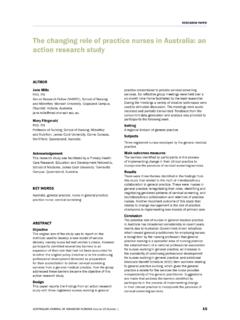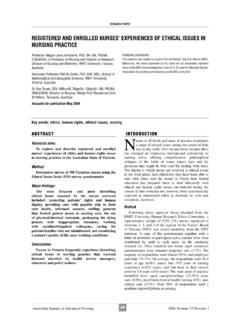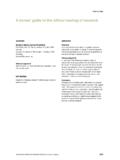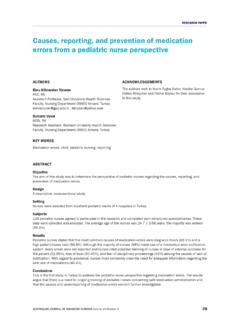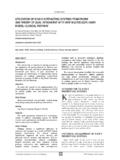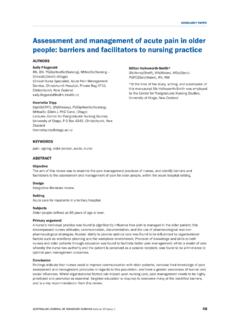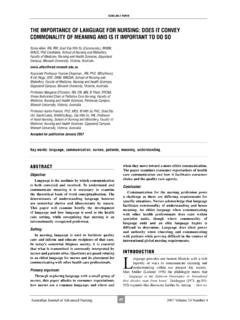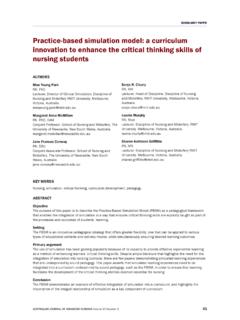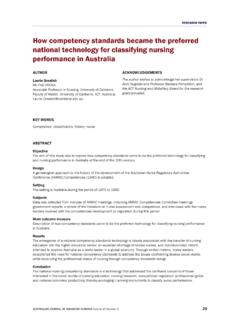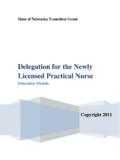Transcription of What is psychosocial care and how can nurses …
1 AUSTRALIAN JOURNAL OF ADVANCED NURSING Volume 28 Number 361 SCHOLARLY PAPERWhat is psychosocial care and how can nurses better provide it to adult oncology patients AUTHORM elanie Jane LeggRN, GradCertPH, GradDip Nursing Science ( oncology ) Registered Nurse, St Andrews Hospital, South Australia. KEY WORDS psychosocial care , oncology , communication, assessment ABSTRACT ObjectiveThis paper explores psychosocial care ; the potential barriers, how nurses provide it, utilise assessment tools and the impact, issues and benefits of providing effective psychosocial argumentNurses are in a unique position to monitor patients and their psychosocial care . However there remains a barrier to exploring some of these facets of care .
2 nurses need to be more inclusive of patient s sexuality, spirituality, optimism and hope when assessing psychosocial care and quality of life as these subjects can be the least explored by staff with their patients. ConclusionAs hospital nurses we see the patient and their family throughout their cancer journey and are in a unique position to monitor a patient s psychosocial coping and any distress. Providing psychosocial care to patients is essential but can be an over looked part of nursing care . In university we are taught how to be nurses but how to communicate with patients and other health care professionals is part of on the job training. psychosocial care is part of a holistic patient perspective and allows patients to seek both informational and emotional support from care givers to help them manage their cancer journey.
3 AUSTRALIAN JOURNAL OF ADVANCED NURSING Volume 28 Number 362 SCHOLARLY PAPERINTRODUCTIONP sychosocial care is important not only to patients but also to the staff providing that care . Patients consistently report having significant informational and emotional needs that are often unmet during their cancer journey (Sussman and Baldwin 2010). nurses can provide both care and support with verbal and written advice to patients. Written information is especially important for newly diagnosed patients who may not retain a lot of information due to an overload of information at initial diagnosis. This allows patients to base their understanding of cancer on sound information rather than anecdotes and misinformation (Moody 2003).
4 nurses play a pivotal role in the psychosocial care of oncology patients throughout their journey. nurses see patients at their worst and at their best; from diagnosis, through treatment, through to cure or palliative and end of life care , it is a long journey which is shared between patient and health care practitioner. There are two important issues in the delivery of psychosocial care to cancer patients: recognition of distress and the available mental health resources (Muriel et al 2009). The question then is how effectively do we address psychosocial care with our patients? what is psychosocial care ? psychosocial support involves the culturally sensitive provision of psychological, social and spiritual care (Hodgkinson 2008).
5 nurses play a unique role in supporting patients; by building dialogue with patients nurses can begin to understand how patients view themselves as individuals, what is important to them, and how their relationship with others may affect their decisions and their ability to live with those decisions during their treatment and beyond (Ellis et al 2006). Good communication and assessment skills are essential to building a rapport with patients and can help the nurse develop a clinical relationship with the patient and their family. In some cases cancer can be considered a chronic disease, and with that the patient and their family will be hospitalized throughout their disease trajectory.
6 This gives hospital based nurses the optimal chance of building and gaining patients trust and initiating support for patients and their family. nurses strive to treat patients individually as each patient requires specific physical, symptomatic and psychosocial care (Watts, Botti and Hunter 2010). The provision of good psychosocial care has been shown to be beneficial for patients by reducing both psychological distress and physical symptoms through increasing quality of life, enhancing coping and reducing levels of pain and nausea with a consequent reduction on demands for hospital resources (Ellis et al 2006; Carlson and Bultz 2003).Why is psychosocial care important?Approximately 350,000 Australians are diagnosed with cancer each year and as a consequence will experience a variety of psychosocial and emotional responses (Botti et al 2006).
7 A study by Kenny et al (2007) found up to 60% of patients diagnosed with cancer have major difficulties dealing with psychological issues and these patients report oncology providers do not consider psychosocial support integral to their care and fail to recognise, adequately treat, or offer referral for psychological distress (Muriel et al 2009). psychosocial care is important; it has a huge impact on quality of life and encompasses a broad spectrum of issues in cancer care including physical, social, cognitive, spiritual, emotional and role functioning as well as psychological symptomology, pain and other common physical symptoms such as headaches, sleep disturbance and gastrointestinal upset (Carlson and Bultz 2003).
8 All oncology patients will be affected in some way by their treatment. Structured assessment undertaken by oncology nurses enables us to identify patients at risk for poor adjustment early and can help to direct the use of interventions aimed at fostering a sense of optimism and ultimately improve health related quality of life during survivorship (Mazanec et al 2010). As hospital nurses we see the patient and their family throughout their cancer journey and are in a unique position to monitor a patient s psychosocial coping and any distress. Emotional distress can occur at any time along the disease trajectory and is defined as a change in thinking, feelings and behaviours that occur in the response AUSTRALIAN JOURNAL OF ADVANCED NURSING Volume 28 Number 363 SCHOLARLY PAPERto diagnosis, prognosis, treatment and events that occur in the clinical course of cancer (Grimm 2005).
9 Just as the patient is an individual so to is the disease trajectory on which they travel and there is no uniform response to treating all patients with the same type of cancer in the same way. How can we provide psychosocial care ? Providing good psychosocial care comes down to good communication skills, both verbal and non verbal. Communication in the context of cancer care includes general interactional skills to convey empathy and support and to provide medical information that is understood and retained. A relationship of health care providers with patients is based on trust, being open and honest, understanding, being present, respect, setting mutual goals and providing social support (Ritchie 2001).
10 This relationship can be an important support and buffer for cancer patients experiencing distress (Rodin et al 2009b). Non verbal communication can convey a great deal to patients who may scrutinise their doctors or nurses for nuances of expression or demeanour (Fallowfield and Jenkins 1999). Non verbal communication is seen by patients as indicators for good or bad news just as much as the actual words spoken. Verbal communication is crucial to building and maintaining this relationship, to transmit information, to provide support and to negotiate treatment decisions (Rodin et al 2009a). The relationships nurse s build with patients can also vary among patients; the age and gender of the patient can have an impact on the relationship built.
